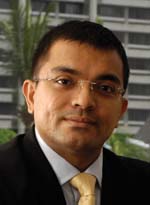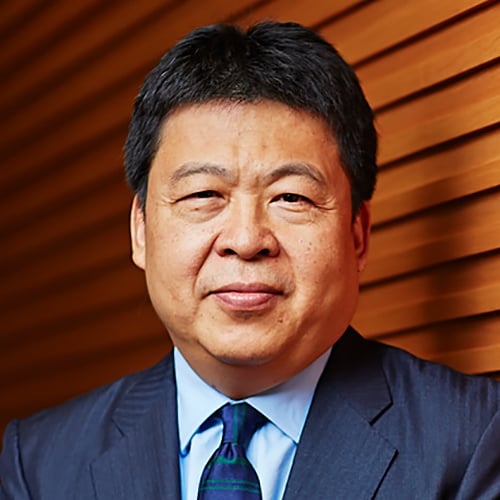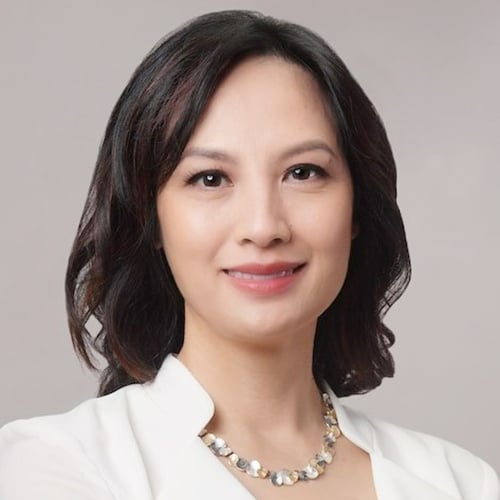 |
|
| Muzaffar: Boost of confidence in Islamic finance |
These are promising times for the Islamic finance industry. While it is one of the fastest growing segments in the global finance industry, it still only represents a tiny 1% to 5% of the total global financial assets.
“The global Islamic finance industry has been growing at a double-digit annual growth rate during the past years and is targeted to reach US$2 trillion in the next three to five years,” says Muzaffar bin Hisham, CEO of Maybank Islamic. “Given the overarching principles of risk-sharing and profit-sharing in Islamic finance, it is a boost of confidence in Islamic finance as a viable alternative to conventional financial services. Conventional investors have become aware that they too could benefit from investment in Shariah-compliant funds and are contributing to the significant asset growth in the Islamic banking sector.”
Such expectations illustrate the industry’s enormous potential as it enters a new decade, and financial institutions are positioning themselves to take advantage of the opportunities.
As a major international Islamic financial centre, Malaysia has attracted banks from the Gulf Cooperation Council (GCC) countries, the latest of which is the Bahrain-based Elaf Bank, which in June was granted a licence by Bank Negara Malaysia (BNM), the central bank, to carry out international Islamic banking business in the country. There are also a number of financial institutions vying for the two mega Islamic bank licences that BNM will issue. In September 2010, several foreign insurance companies were granted takaful licences in joint venture with local houses to ride on the industry’s growth momentum.
On the other hand, Malaysia’s Islamic banks are themselves looking for opportunities across the region – such as in Indonesia, Singapore, Brunei, Thailand and Pakistan – even as the other jurisdictions are working on enabling their legislation to get the industry off the ground.
South Korea again failed in February this year to pass a bill, originally proposed in 2009, that would allow the local sukuk to obtain a tax break on profits. Hong Kong has yet to kick-start its sukuk issuance, even though its Securities and Futures Commission forged a mutual recognition agreement with the Securities Commission of Malaysia in November 2009 to develop the Islamic capital markets.
Singapore, meantime, is undertaking fresh initiatives to promote its Islamic finance market. Lim Hng Kiang (林勛強), the minister for trade and industry, and the deputy chairman of the Monetary Authority of Singapore (MAS), told the second annual World Islamic Banking Conference – Asia Summit (WIBC-AS) in Singapore in June that they will issue new income tax regulations for Islamic finance. The ministry of finance will provide additional clarification and a detailed explanation of the income tax treatment on more prescribed Islamic financing arrangements, including financing through a partnership arrangement, project finance as well as interbank placement of funds, he discloses.
“This is in keeping with our long standing principle that Shariah-compliant products should not be disadvantaged in terms of regulatory and tax treatment where the economic substance and risks are similar to conventional products,” he explains. “We hope that this will expedite the development of more such financial products in Singapore.”
Market to watch – Indonesia
 |
|
| Badlisyah : Huge opportunity in Indonesia |
The one market to watch in 2011 from the growth perspective is Indonesia, according to CIMB Islamic Bank CEO Badlisyah Abdul Ghani. “This is where most of the growth is expected, depending of course on the Indonesian government putting in place the right infrastructure for the industry,” he comments. “If this is not done, that growth may not necessarily come.”
Bank Indonesia deputy governor Halim Alamsyah, a keynote speaker at the WIBC-AS, says Indonesia’s sukuk market is progressing well with a nominal amount of US$6.2 billion as of May 2011, and recorded an annual growth of 9.3% in 2010.
Badlisyah notes Indonesia is the single largest Islamic country in the world based on population and in the top two Islamic countries in total gross domestic product (GDP) outside of Turkey. “So the sheer size of its GDP and the sheer number of its population tell you that there is a huge opportunity for Islamic finance in Indonesia, particularly now with the focus given by the government,” he says. CIMB Islamic is represented in Indonesia through its Islamic sub-branch CIMB Niaga Syariah.
The opportunities in Indonesia, on the capital markets side, are exemplified by the US$1.2 billion Shariah-compliant financing in May this year for mobile telecommunications carrier Natrindo Telepon Seluler, also known as Axis, which is a subsidiary of Saudi Telecom. Axis is planning to use the funds to expand its mobile broadband network in Indonesia over the next five years.
Riding on the growth and interest in Islamic banking, Maybank Islamic, according to Muzaffar, will focus on regional markets in Asean and potentially in the Middle East, Pakistan, London and Hong Kong/China. “Of the 1.6 billion Muslims worldwide, one billion are in Asia and the Asian markets are growing at a faster rate than others,” he points out. “The growth in liquidity from the Middle East and linking it with this region, constitute the most opportunistic markets for growth of Islamic financial services for the Maybank group.”
Muzaffar says the positive support and commitment from regulators across the region will potentially contribute towards an upsize in demand for more cross-border wholesale Islamic financial services activities.
Role of derivatives
In bringing about new growth opportunities, the Islamic finance industry still requires new infrastructure and product solutions. One infrastructure development that is taking shape in the international Islamic financial system is the establishment of the International Islamic Liquidity Management Corporation (IILM) launched in October last year.
Commencing its operation in Kuala Lumpur on February 1 this year, its main task is to issue short-term, multi-currency liquidity instruments to facilitate the cross-border liquidity management between financial centres and, at the same time, enhance the financial inter-linkages. Bank Negara governor Zeti Akhtar Aziz says the IILM is scheduled to roll out the issuance later this year and this will allow for more efficient management of financial flows across borders and thus contribute towards the efficient internationalization of Islamic finance.
Market participants have highlighted the role of derivatives in pushing the growth of Islamic finance. Badlisyah describes Islamic derivatives as critical for the well-being of the Islamic finance industry because they facilitate and manage risks for the banks and other institutions. “Without derivatives, they cannot grow since it would be difficult for them to acquire new assets and they cannot manage their exposure with respect to rates, currency and market risks and the like,” he says.
He continues: “If you look at the Malaysian market, which started using derivatives earlier than most of the other markets, we have seen the most stable growth in Islamic finance of any country. There is not much activity in Islamic derivatives in other markets because they do not understand their use. They assume that derivatives are evil and tools for speculation. This is not true because Islamic banks use derivatives purely for hedging of risks. The only differentiation on derivatives whether it is for hedging or for speculation is the user. If the user wants to abuse them by speculating, they are doing something that is detrimental to the whole industry. You cannot blame the instrument for its abuse by irresponsible people. That is how I see it.”
Ahsan Ali, managing director and head of Islamic origination at Standard Chartered Bank agrees: “Derivatives are vital to the Islamic finance industry. By not allowing the Islamic banks and corporates to use these instruments, you are putting the Islamic investors at risk. What the borrowers usually did in the past was to arrange their sukuk issuances or their syndications in the Islamic way, but because there are no available Islamic hedging instruments, they would do their hedging in the conventional way.”
Standard Chartered Bank has an array of Islamic hedging products covering rates, foreign exchange and commodities. The products are available both in the Middle East and in Malaysia, and are based on the same Islamic concepts thus promoting cross-border standardization. In April this year, the bank secured regulatory approvals to offer Islamic commodity hedging solutions for its clients in Malaysia, targeted at producers and traders of the underlying commodities. These hedging solutions were already launched in the Middle East last year.
The rapid growth of the industry is creating a big gap in the supply of Islamic talent. “The Islamic finance industry is growing rapidly and obviously there is pinching of talents between institutions,” notes Rafe Haneef, CEO of HSBC Amanah Malaysia. “That is a major problem. What we have done to plug the supply gap in Islamic talent is to take people with conventional banking background as well as fresh graduates and provide them with Shariah training in order to become HSBC Amanah specialists.”
Indeed, as Yousuf Al-Jadia, director for strategic development at Qatar Financial Centre Authority points out, the awareness and demand for Islamic finance are growing but one of the limiting factors has been the availability of talented and experienced people to deliver the services and products. “Almost every country in the world has an educational system designed to provide the skills for people to go into conventional finance, and as Islamic finance grows, we also need to have training and education in place to deliver talent into the Islamic finance industry,” he says.









